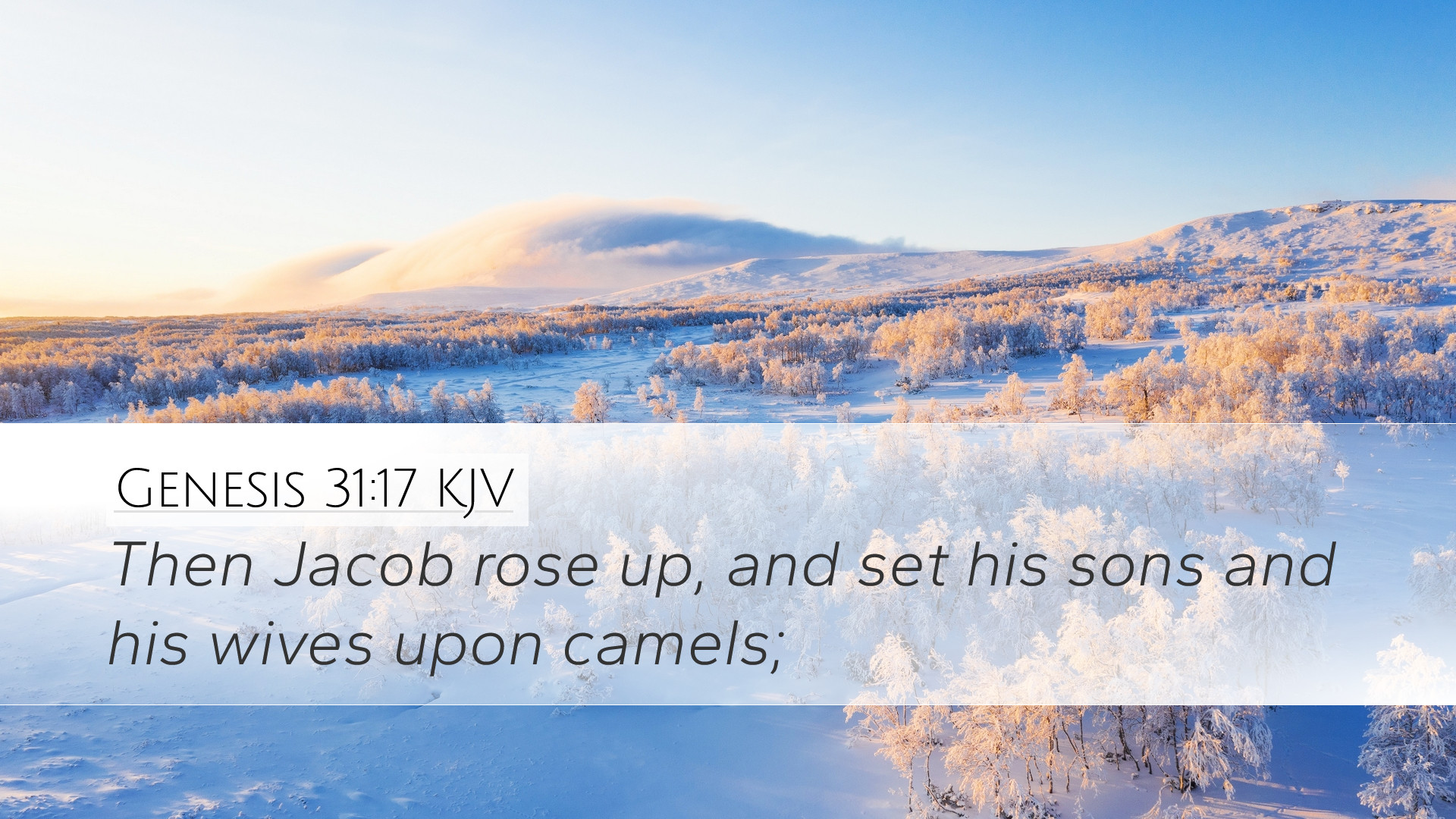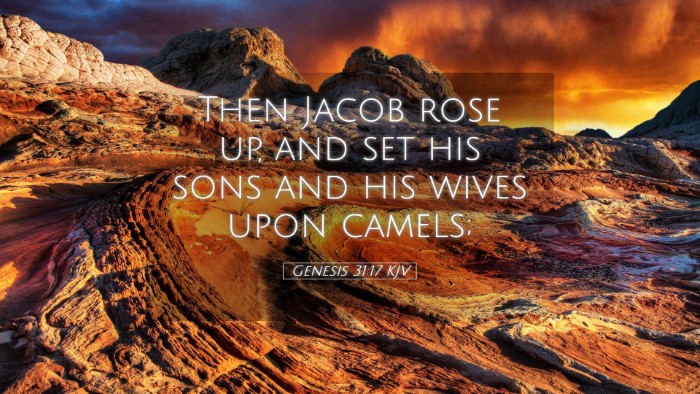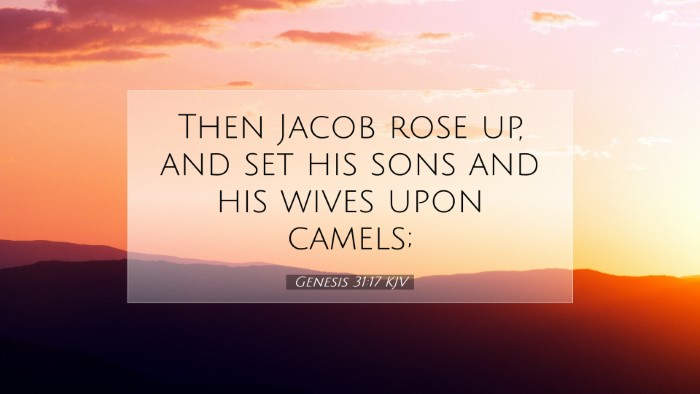Commentary on Genesis 31:17
Genesis 31:17 states:
"Then Jacob rose up, and set his sons and his wives upon camels;"
Introduction
This pivotal verse in Genesis captures a moment of significant transition in Jacob's life. After enduring years of manipulative dealings with Laban, Jacob finally resolves to return to his homeland. This verse acts as a summary of Jacob’s decisive action, symbolizing both physical and spiritual movement towards God’s promised land.
Contextual Overview
Jacob’s journey from Haran marks the culmination of his long service under Laban, where he faced numerous challenges, including deception, relational strife, and spiritual growth. The context preceding this verse illustrates Jacob's struggles and the divine intervention of God that beckons him to return.
Historical Background
Jacob had spent over twenty years in Padan Aram, accumulating wealth and a significant family. However, underlying tensions with Laban, who had changed Jacob's wages multiple times, prompted divine instruction for Jacob to return to Canaan (Genesis 31:3). This historical backdrop is essential to understanding the weight of Jacob's decision to leave.
Theological Implications
This verse is pregnant with theological significance, reflecting themes of providence, obedience, and identity. It signals Jacob's readiness to follow God's direction.
Divine Providence
Both Matthew Henry and Adam Clarke emphasize God’s providence throughout this passage. Jacob's decision to flee is not merely a human initiative but a response to divine prompting. The earlier promise made to Abraham and Isaac concerning the land is intricately tied into Jacob's return, suggesting that God's overarching narrative involves the continuation of His covenant family, underlining His faithfulness to His promises.
Obedience and Faith
Jacob’s actions reflect a profound act of obedience. Matthew Henry notes that Jacob’s rising up signifies not just physical movement but also a spiritual awakening to fulfill God’s command. This act of leaving all he had known is not unlike the later call of Jesus to His followers, urging them to take up their cross, indicating the cost of faith.
Identity and Legacy
This journey signifies a reclamation of Jacob's identity. After years of struggle and transformation, Jacob’s return is an assertion of his rightful heritage as the heir of the Abrahamic promise. Henry suggests that this departure sets a crucial precedent for the future of Israel as a nation, instructing subsequent generations on the importance of following God's guidance.
Character Analysis
Jacob is depicted as a complex character, embodying both human frailty and divine purpose. The act of gathering his family and belongings suggests a sense of responsibility and leadership that emerged during his time in Haran.
The Role of Leah and Rachel
Jacob's wives, Leah and Rachel, played significant roles in his journey. Their presence on camels underscores their active participation in this family decision. Albert Barnes notes that Rachel's decision to leave her father's house, alongside Leah's compliance, speaks volumes about their shared vision and commitment to the God of Jacob. This dynamic reflects the complexity of familial relationships and the struggles inherent within them.
Lessons from Jacob's Leadership
Jacob's leadership style can serve as a tangible lesson for contemporary pastors and leaders. He exemplifies the importance of making pivotal decisions with a clear sense of direction from God, as well as the necessity of considering the well-being of those whom he leads. The decisions that pastors make today in guiding their congregations can learn much from Jacob's navigational courage.
Practical Applications
This moment in Scripture serves as a catalyst for personal reflection on the nature of obedience and the understanding of God's calling. As individuals and communities of faith, several key applications arise:
- Listening for God's Call: Like Jacob, believers are called to be attuned to the divine whispers leading them. Prayerful discernment is essential.
- The Importance of Community: Jacob brought his family along, indicating the value of involving those we lead in significant spiritual transitions.
- Embracing Change: Emulating Jacob's courage to leave behind the familiar can initiate spiritual growth and deeper reliance on God.
- Covenantal Responsibilities: Just as Jacob's actions have ramifications for future generations, contemporary actions in following God can impact the legacy of faith for those who follow.
Conclusion
Genesis 31:17 serves as a profound reminder of God’s faithfulness and the importance of heeding His call. Jacob’s resolute decision to rise and move forward serves as an impetus for believers to reflect critically on their own spiritual journeys. Through careful examination of this moment in Scripture, scholars, pastors, and students alike can glean invaluable insights that not only enhance their understanding of the text but also apply those truths to their lives and ministries.
This commentary encourages all readers to embrace the transformative power of divine guidance, striving to rise up and follow God’s direction with faith and courage, knowing that our journeys may also bear fruit in fulfilling God's promises.


